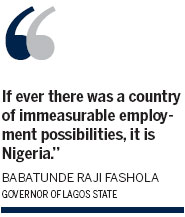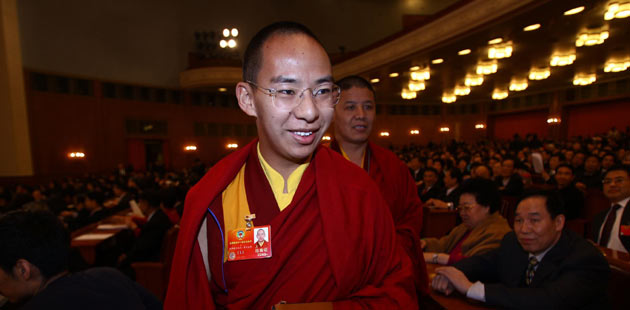'Nothing is impossible' Fashola tells students
Updated: 2011-03-22 07:53
(China Daily)
|
|||||||||||
Lagos State governor delivers innovation message to the University of Nigeria
As central government prepares to invite more foreign investment to the country, the views of Lagos State's dynamic governor Babatunde Raji Fashola seemed ever more salient as he delivered a speech about Nigeria's Abundance of Possibilities to tomorrow's leaders at the University of Nigeria earlier this year.
Speaking in terms of job creation, governor Fashola urged all Nigerians to adopt the attitude that nothing is impossible, "an attitude that resolves to create everything even when there is nothing," he said. "That is the attitude that has made the telephone possible, air travel a reality, electricity a reality and so many of the innovations that now improve the quality of our life. The inventors of these life changing facilities simply refused to accept defeat," he said.
"A person in his youth would have only one rival, that is his own potentialities; and he will have only one failure, that is, failing to live up to his own possibilities. The second factual basis for hope is that every problem of Nigeria is an opportunity, not only for our vibrant population of youths but also for others of like mind!
"In further exploring the theme of the lecture, the best place to start is the rather astounding report of massive unemployment in Nigeria which is very curious because if ever there was a country of immeasurable employment opportunities, it is Nigeria.

"More than any other nation of its population and size, we have houses, roads and bridges to build. Looking around us, it cannot be hard to see that we urgently require engineers, technicians and artisans in their hundreds of thousands."
As Fashola pointed out, the unemployment challenge is a contradiction within a country that has a lot of job shortages, in terms of teachers, doctors, nurses, lawyers, firemen, waste management personnel and administrators who are ready, able and willing to work.
He also spoke about the country's over-reliance on imports, in everything from footwear and clothes, to fruit, vegetables and canned beef, and from motorcycles and cars to wristwatches. Rather than send these resources-which could all be found at home-overseas to be made by foreign suppliers, Fashola asked: "Why can't we find the resources to put our own people to work?"
With a population of 150 million and a growth rate of 2.27 percent, which is almost double the world average of 1.17 percent, Fashola explained that if the country does not begin to create goods and services for itself, it may never be able to resolve the quandary of unemployment.
"The inescapable reality is that for so long we have neglected the needful. In tertiary education we have left our inherited curricular virtually unchanged," he said.
"As a result, we have not trained our graduates in tandem with the requirements of our communities. We have produced graduates in the areas where our economy makes no demand for them".
Innovation, the governor said, can drive Nigeria's development if more of its universities participate in capital formation projects, such as technology parks, business incubator facilities, introduce entrepreneurial training and internships into their curricular and encourage students to take research from the University to commercial and industrial firms.
Creating links
He said creating links between knowledge generation and enterprise development is one of the greatest challenges facing developing countries like Nigeria, adding that Nigeria must urgently begin the process of harnessing its many potentials not just to create employment for young people, but to develop the society as a whole.
"I am certain that as you listen to me you must be wondering that if these possibilities exist, why have things not changed? The answer is very simple. We have not tried hard enough; and in sufficient numbers to create the critical mass that will give credibility to the possibility of change", he said.
The governor told the audience that in Lagos, the administration has resolved to engage in less talk and more work, which according to him "represents the surest way to demonstrate that the possibilities are real and within the people's reach.
"We are therefore reviewing the academic programs of the Lagos State University with a view to opening new faculties in areas of need or new subjects of emerging relevance in existing faculties", he said.
"One of these is the recently introduced Faculty of Transport Studies. For a Megacity, which has enormous transportation challenges and is trying to build not only mass transit bus system, but also a network of railways and ferry routes, we considered this Faculty a matter of urgent importance.
"We have also adopted a policy of proper and continuous maintenance in all public facilities, including hospitals, court complexes, schools, and roads in Lagos State, all of which create more employment opportunities for skilled and unskilled manpower", the governor said.
He reiterated that countless opportunities had also been discovered in farming, despite the fact Lagos has the smallest land space of all the states in Nigeria, where a successful micro-financing scheme is underway.
In the meantime, he said, the Lagos Ignite Program "bridges the gap between the products of the Nigerian educational system and the needs of employers of labour while the Ignite programme prepares young people who are established or intending business owners to meet the demands of the business environment."
He said this is achieved by equipping them with the unique set of skills required for identifying business opportunities and transforming them into successful enterprises and also providing a conversion program for arts and science graduates who want to be employed as teachers or health-care workers.
China Daily
(China Daily 03/22/2011 page19)
Hot Topics
Wu Ying, iPad, Jeremy Lin, Valentine's Day, Real Name, Whitney Houston, Syria,Iranian issue, Sanyan tourism, Giving birth in Hong Kong, Cadmium spill, housing policy
Editor's Picks

|

|

|

|

|

|







